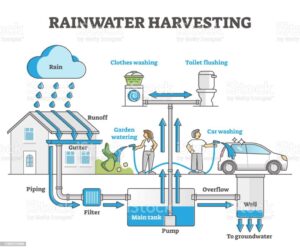Seemed like only yesterday when we were doing New Year greetings, and before we could even blink it is already April and the Easter holidays are here. This time of the year usually sets in the rainy season and in the past few days we have been blessed with holy showers.
Well , depending on what you situation is, you may see the blessing in the rains or the curse in it, especially if your residency is flood prone or water logged. One way we can farm a blessing out of the rains is to harvest or collect it to meet our domestic water needs.

How does it work?
As a very basic system, rainwater harvesting is collecting rain from the roof of a house and directing the water through a channel or gutter into a storage facility like a barrel. For such a basic system which doesn’t factor in filtration and enhanced storage, you can use the water for basic household activities like watering a garden, fire suppression, or as grey water to flush the toilet.
Rainwater collection systems can be as simple as collecting rain in a rain barrel or as elaborate as harvesting rainwater into large cisterns to supply your entire household demand. A more elaborate system that would provide more potential end uses for the water would include a collection system and several layers of filters to keep dirt and debris out of the water supply.
An appropriate storage tank should have a way to safely handle overflow water and be made from materials that won’t leach into the water and will inhibit bacteria growth. That container should be then hooked to a control system that can further filter the water for drinking-level purity if needed, or at least to a monitor that tracks the water level. Finally, the system would require a pump to direct water, a flow meter, and backflow prevention system, all of which would need to be hooked up to a power source according to treehugger.
Why harvest rain?
Well as obvious as the benefits are, the process seems tedious in the minds of prospective users who will rather rely on good old tap water. If we however paused to consider the idea of using drinking water to flush our toilets and water our lawns are not only wasteful and irresponsible, it contributes to pressure on our water sources with scarcity and shortages a real threat. Rainwater when well harvested can be used to water your lawns and gardens, wash vehicles, refill your fountains, swimming pools and fish ponds amongst many others.
Which systems can I employ?
There are a variety of systems to harvest rainwater, from the basic to the most complex. Which system you employ will largely depend on which level of the collection you. For the uninitiated, it is advisable to start from the least complex, a few of which are offered below:
Rain Barrels
You can start with the oldest and easiest system of harvesting rain through a rain barrel. This method is the most common and one that many people are familiar with. This involves installing a barrel at a gutter downspout to collect rainwater. The actual barrel may be a recycled barrel or a new commercially available rain barrel.
Rain Garden
A rain garden is a sunken landscape that uses native plants, local soil, and mulch to remove pollutants from water, and allows it to percolate into the ground. It’s easy to create, looks good all year-round and has a positive impact on the environment.
Rain Saucer
Another simple DIY technique to collect rainwater without much hassle is to create rain saucers. These form a great free standing rain collection system which fill up surprisingly fast. Looking like an upside-down umbrella, the rain saucer unfolds to form a funnel which fills the containers with rainwater. Since this easy-to-deploy system catches rain straight from the sky, it also decreases the chances of contamination as well.
There you have it folks, simple ideas to collect rainwater to diversify your water sources, make some savings as well as protect the environment.
The writer is the Executive director of Yecham Property Consult
& Founder of Ghana Green Building Summit.
Email: [email protected]
LinkedIn: Cyril Nii Ayitey Tetteh










